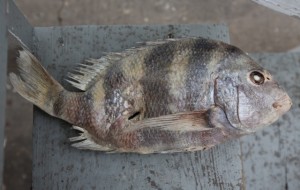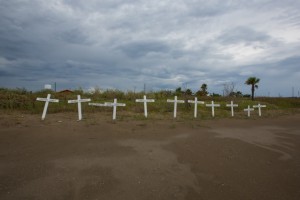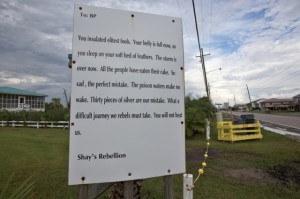http://www.wakingtimes.com/2013/10/23/setting-record-straight-bps-failed-gulf-mexico-cleanup/
October 23, 2013 | By WakingTimes |
Julie Dermansky, DeSmogBlog
Waking Times
The second phase of hearings in the legal battle over the BP oil disaster in the Gulf of Mexico ended on October 17th. Following two weeks of testimony by the U.S. Department of Justice and BP, U.S. District Court Judge Carl Barbier will determine what quantity of oil was spilled into the Gulf. He will also decide whether BP was simply negligent or grossly negligent.
The Justice Department claims 176 million gallons of oil were spilled; BP argues that it only spilled 103 million gallons. Under the Clean Water Act and the Oil Pollution Control Act, Judge Barbier can fine BP and its partners $1,100 per barrel should he find they were negligent in their actions leading up to the spill and in the cleanup afterwards. The fine would rise to $4,300 per barrel if he finds the companies were grossly negligent or acted with willful misconduct, as the State Department alleges.Using the State Department’s numbers, the fine could be $18 billion; if BP’s numbers are accepted, the fine could be $10.5 billion.
The outcome of the case will play a role in all subsequent litigation around the BP disaster, including the case of Dean Blanchard, owner of Dean Blanchard Seafood, the largest shrimp buyer and wholesaler in the Gulf region. Blanchard’s company in Grand Isle, Louisiana is all but shut down now. Blanchard keeps a small fraction of his staff employed – more of them than he needs to keep his dwindling operation going. He doesn’t have the heart to make further cuts.
Blanchard estimates his company’s loss at over $100 million. He estimates that his business is now 15 percent of what it was before the spill. He keeps his doors open only because he can’t bring himself to close down. He recently moved part of his business to a different area where some shrimpers are still able to harvest product, but he faces an uphill battle against BP, and an uncertain future, along with many other Gulf fishermen.
Dean Blanchard talks about the use of the chemical dispersant Corexit during the BP oil spill:
This fall, BP launched a new PR campaign depicting itself as a victim of fraud. The BP ads accuse people of filing fraudulent claims, and asks upstanding citizens to turn them in. Blanchard doesn’t doubt there are fraudulent claims, but holds BP responsible for allowing that to happen.
He and others in the fishing industry offered to help BP figure out who the real fishermen were since they know their community well, but BP turned them down. Blanchard suggests that BP may have wanted to create chaos, initially giving a token payment to anyone who wore a pair of white boots into the claims offices so they could play victim later, just as they are doing now. On Facebook, activists encourage those affected by the spill to call the BP fraud hotline set up for this campaign and choke the company’s line with calls accusing BP of fraud.
BP’s other commercials claim that all fishing areas have reopened, although the waters near Grand Isle are not. Blanchard wonders why the government continues to allow the company to lie in its advertising.
BP’s “Make it Right” campaign, which asserts that things are back to normal, is a source of rage for many along the Gulf Coast. And Dean Blanchard doesn’t pull punches about it:
Some of the shrimpers who sell to Blanchard periodically monitor the areas they used to work in. They have caught deformed shrimp with no eyes and oil in their gills, and other fish with lesions.
Recently, a fisherman gave him a fish with a hole in the middle of its body that Blanchard has kept on ice to show people as an example of the abnormalities in the seafood he has seen since the spill.

Image Source
Fish with mysterious hole in its side caught by a fisherman and given to Blanchard.
Despite the government and company assurances that the seafood is safe, Blanchard’s insurance company dropped his product liability insurance. Blanchard wont be covered if the product he is selling turns out to be unsafe.
Besides the fiscal strain, Blanchard worries about the health of his family. He says everyone he knows on the island now has sinus and breathing problems.
Many have moved, including longtime resident Betty Doud, her daughter and grandchildren. She and Blanchard both tell me they can breathe better when they travel away from Grand Isle. Doud and her daughter are renting homes near New Orleans.
Over lunch, they rule out places to resettle that are sites for potential environmental disasters, crossing off all the states that have fracking activity, for instance. Doud recently sold off her Grand Isle home and won’t ever move back. Like Blanchard, she’d rather sue BP than accept the meager settlement it offered for her loss.
BP has been forced to take some responsibility for the health issues faced by residents and cleanup workers. In May 2012, as part of the Deepwater Horizon oil spill settlement, $36 million in grant money was earmarked for behavioral and mental healthcare needs, making it possible for residents and cleanup workers to file claims in a class action suit against BP for their health issues.
Meanwhile, more tar mats containing BP oil were discovered by the Coast Guard after the recent tropical storm Karen.
The amount of oil recovered in the cleanup process in Louisiana has grown this year. Garret Graves, chairman of the Coastal Protection and Restoration Authority, suggested in an interview with Reuters that the initial cleanup had clearly been insufficient since the amount of recovered oil increased this year.
Oil turning up on these beaches is no surprise to residents like Betty Doud, who witnessed activities in 2010 that suggested to her that cleanup workers were burying the oil rather than taking it away.
Dean Blanchard isn’t surprised either. He has no doubt that the reason there are no shrimp left in the area rests on the fact that Corexit was used to chemically disperse the oil, letting it sink to the sea floor where the shrimp reproduce.
The use of dispersant by BP irks Blanchard the most. He believes that if the government hadn’t allowed BP to disperse the oil, it could have been cleaned up.
“I never knew you could buy a branch of the government, but BP bought the Coast Guard,” he says. “They were complicit in letting BP do what they wanted.”
Blanchard is irked by the fact that BP was making tons of money and still cutting corners – putting the health of Gulf Coast residents and the economy at risk. And the fact that BP was allowed to do so by the government also riles him.
“Someone at the top needs to go to jail,” Blanchard says.

Graveyard erected to those who died in the BP blowout.

Message to BP on Main Street
Special thanks to Richard Charter